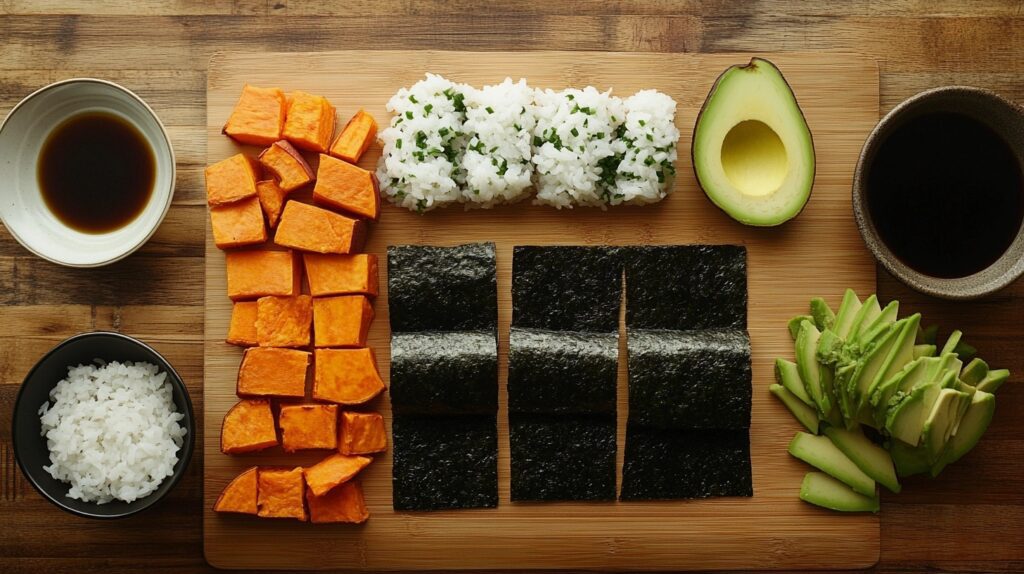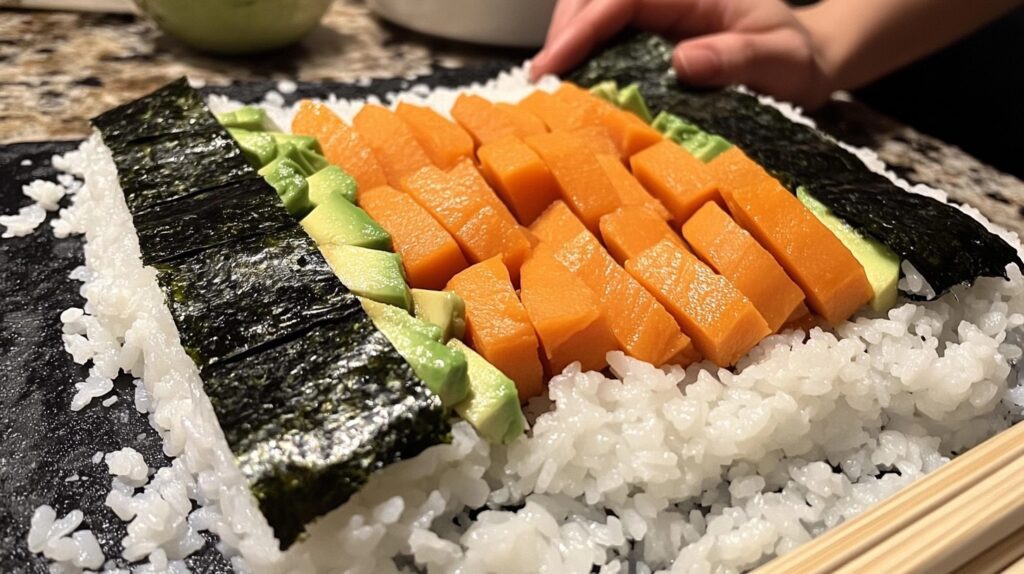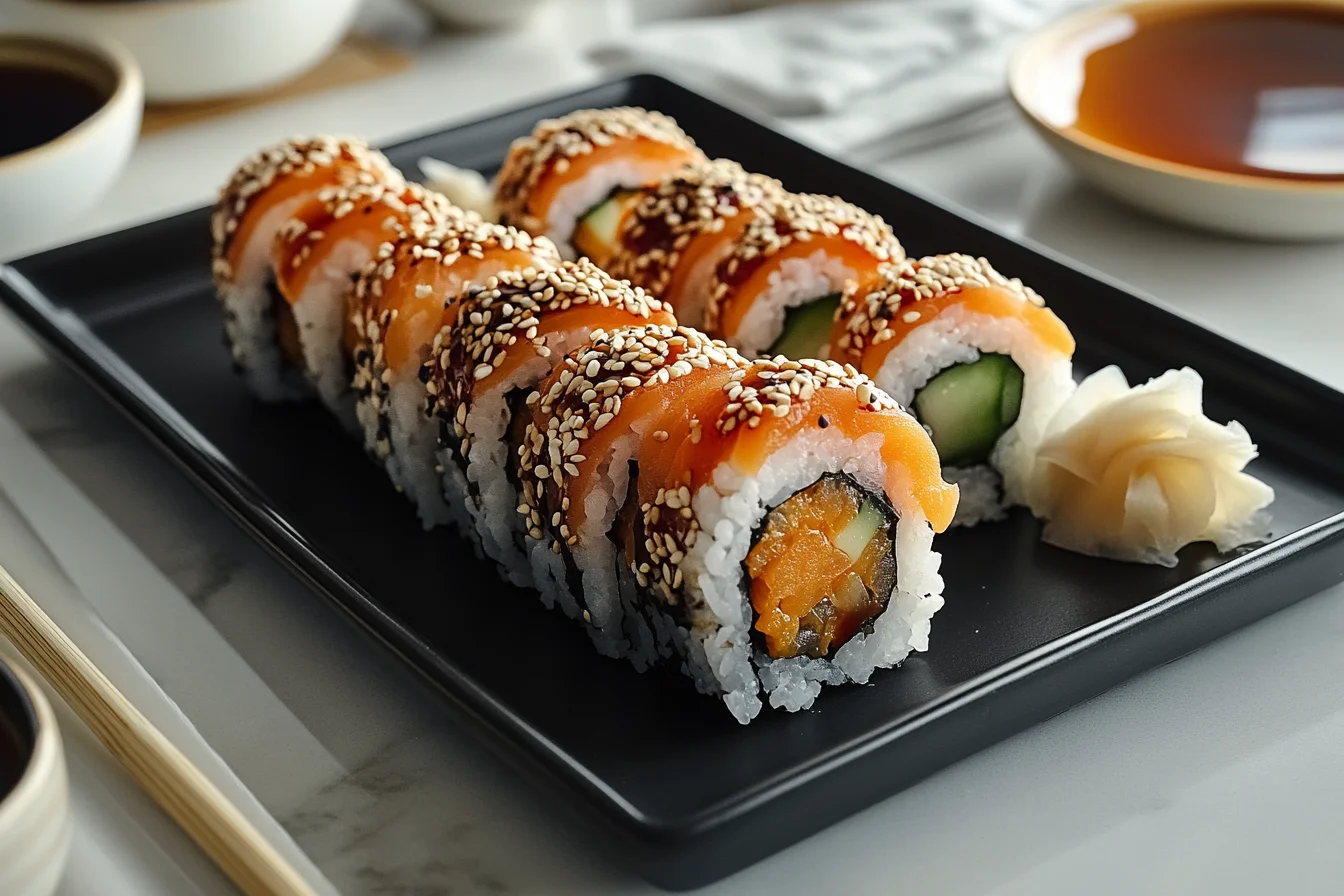Sweet potato sushi rolls are a delightful twist on traditional sushi, offering a vegetarian and vegan-friendly option that’s rich in flavor, nutrition, and creativity. This article explores the origins, ingredients, preparation methods, variations, and nutritional benefits of sweet potato sushi rolls. Along the way, you’ll learn how to craft them at home, discover their cultural significance, and find answers to common questions.
Let’s dive in and uncover the delicious world of sweet potato sushi rolls.
Introduction to Sweet Potato Sushi Rolls
What is a Sweet Potato Sushi Roll Made of?
A sweet potato sushi roll is a type of vegetarian sushi roll made with roasted or tempura-battered sweet potatoes, sushi rice, and seaweed (nori). Often accompanied by complementary ingredients like avocado or cucumber, these rolls strike the perfect balance between savory and slightly sweet. They’re served with traditional sushi condiments such as soy sauce, wasabi, and pickled ginger, offering a complete sushi experience without fish or seafood.
Origins of Sweet Potato Sushi Rolls
The origins of sweet potato sushi rolls are deeply tied to the evolution of sushi itself. Sushi, a culinary tradition rooted in Japan, started as a method of preserving fish using fermented rice. Over centuries, it transformed into an art form that celebrates fresh, seasonal ingredients.
Vegetarian sushi options, such as sweet potato rolls, have grown in popularity as sushi culture expanded globally. With the demand for plant-based diets on the rise, sweet potato sushi rolls emerged as a creative and inclusive adaptation of traditional sushi.
Why Sweet Potatoes in Sushi?
Sweet potatoes bring a unique texture and flavor to sushi rolls. Their natural sweetness pairs beautifully with the tangy sushi rice and savory nori. When roasted or fried, their soft, creamy interior and lightly crisp exterior provide an irresistible contrast. Sweet potatoes are also packed with nutrients, making them a healthier alternative to other ingredients often used in sushi.
The Ingredients in Sweet Potato Sushi Rolls
The Key Ingredients
Crafting a sweet potato sushi roll involves a handful of simple yet carefully chosen ingredients that come together to create a flavorful and satisfying dish. Here’s a closer look at what makes these rolls shine.

Sweet Potatoes
Sweet potatoes are the star ingredient. Their soft, buttery texture and natural sweetness create a contrast to the tangy rice and crisp nori. Depending on the recipe, sweet potatoes can be:
- Roasted: This method enhances their natural sweetness and creates a caramelized exterior.
- Tempura-Battered: Deep-frying in a light, crispy batter adds crunch and richness.
- Baked or Boiled: These techniques are perfect for healthier preparations while retaining the essential flavor.
Sushi Rice
Sushi rice, or shari, is an essential component of any sushi roll. Short-grain rice is seasoned with a mixture of rice vinegar, sugar, and salt to achieve the perfect balance of flavor. Its stickiness ensures the roll stays intact, while its slightly tangy taste complements the sweet potato.
Seaweed (Nori)
Nori, the thin sheet of dried seaweed that wraps the sushi roll, provides a subtle umami flavor and keeps everything neatly bundled. High-quality nori should be crisp and slightly shiny.
Additional Ingredients
While sweet potatoes are the main attraction, additional ingredients can elevate the flavor and texture of the roll:
- Avocado: Its creamy texture pairs beautifully with the sweet potato.
- Cucumber: Adds a refreshing crunch.
- Sesame Seeds: Often sprinkled on top for added nuttiness.
- Sauces: Drizzle spicy mayo or soy sauce for an extra layer of flavor.
Why These Ingredients Work So Well Together
The beauty of a sweet potato sushi roll lies in the harmony of its ingredients. The sweetness of the potato contrasts with the tangy rice, the savory nori, and the optional creamy or crunchy elements. Together, they create a dish that is not only visually appealing but also irresistibly delicious.
For a detailed guide on preparing the sushi rice, check out this helpful resource on Sushi Rice Preparation Tips.
The Making of Sweet Potato Sushi Rolls
How to Make Sweet Potato Sushi Rolls at Home
Creating sweet potato sushi rolls at home might seem daunting, but with the right tools and steps, it’s a rewarding and enjoyable experience. Here’s a guide to get you started.
Equipment Needed
To make sushi rolls at home, you’ll need:
- Bamboo Sushi Mat: Essential for rolling sushi tightly.
- Sharp Knife: Ensures clean cuts for your rolls.
- Rice Paddle or Spoon: Helps spread the rice evenly without sticking.
- Cutting Board: Provides a sturdy surface for slicing ingredients.
Step-by-Step Process

- Prepare the Sushi Rice
- Rinse short-grain rice under cold water until the water runs clear.
- Cook the rice according to package instructions, then let it cool slightly.
- Mix the rice with a dressing of rice vinegar, sugar, and salt to achieve the traditional sushi flavor.
- Cook the Sweet Potatoes
- Peel and slice sweet potatoes into long, thin strips.
- Choose your preferred method:
- Roast: Toss the slices in olive oil, salt, and pepper, then bake at 400°F (200°C) until golden and tender.
- Tempura: Coat the slices in tempura batter and fry until crispy.
- Allow them to cool before assembly.
- Lay Out the Nori
- Place a sheet of nori on the bamboo mat, shiny side down.
- Align it with the edge of the mat for easier rolling.
- Add Rice and Ingredients
- Spread a thin layer of sushi rice over the nori, leaving about an inch at the top edge uncovered.
- Lay the cooked sweet potato strips horizontally in the center of the rice. Add avocado, cucumber, or any other chosen fillings.
- Roll the Sushi
- Lift the bamboo mat from the bottom edge and begin rolling tightly, keeping the ingredients in place.
- Seal the roll by moistening the uncovered edge of the nori with a bit of water.
- Slice the Roll
- Use a sharp knife to cut the roll into even pieces. Clean the knife with a damp cloth between cuts for clean edges.
- Serve and Enjoy
- Arrange the rolls on a plate and garnish with sesame seeds. Serve with soy sauce, pickled ginger, and wasabi.
Tips for Perfect Sushi Rolls
- Rice Texture: Don’t overcook the rice; it should be firm yet sticky.
- Tight Rolling: Apply gentle pressure when rolling to keep the roll intact.
- Experiment with Flavors: Add spicy mayo, sriracha, or teriyaki sauce for extra flavor.
Linking Tradition and Innovation
Making sushi rolls at home is not just a culinary activity but also a way to appreciate the artistry behind this Japanese tradition. For beginners, practice makes perfect, and your rolls will only get better with time.
Variations of Sweet Potato Sushi Rolls
Creative Variations of Sweet Potato Sushi Rolls
One of the best things about sweet potato sushi rolls is their versatility. Whether you’re looking to spice things up or cater to dietary needs, there’s a version of this roll for everyone. Here are some exciting variations you can try.
Tempura Sweet Potato Rolls
For a delightful crunch, tempura sweet potato rolls are a must-try. In this variation, sweet potato slices are coated in a light tempura batter and deep-fried until golden and crispy. The contrast between the crispy exterior and the soft interior adds a layer of texture that’s utterly satisfying. To elevate the experience, drizzle the rolls with spicy mayo or a sweet teriyaki glaze.
Spicy Sweet Potato Rolls
If you’re a fan of bold flavors, spicy sweet potato rolls are for you. This version incorporates a spicy mayo or sriracha sauce, either mixed with the sweet potato filling or drizzled on top. The heat complements the sweetness of the potato, creating a perfect balance.
Avocado and Sweet Potato Rolls
Adding avocado to a sweet potato roll enhances its creaminess and makes it even more indulgent. The buttery texture of avocado pairs beautifully with the soft, sweet potato, while still keeping the roll light and fresh.
Cucumber and Sweet Potato Rolls
For a crunchier bite, consider adding cucumber to your sweet potato rolls. The refreshing crunch of cucumber balances the sweetness of the potato, making this variation especially appealing in warmer weather.
Gluten-Free Sweet Potato Rolls
With a few simple swaps, sweet potato sushi rolls can be made gluten-free. Use tamari instead of soy sauce and ensure your tempura batter (if using) is gluten-free. This variation caters to those with dietary restrictions without compromising on taste.
Vegan Sweet Potato Rolls
Sweet potato sushi rolls are naturally vegan when prepared without any animal-based ingredients. Ensure that the sauces, like spicy mayo, are made using vegan substitutes (e.g., vegan mayo or cashew-based sauces).
Why Variations Enhance the Appeal
Experimenting with variations allows you to tailor the rolls to different tastes and occasions. Whether you want a healthier option or a more indulgent treat, sweet potato sushi rolls provide endless possibilities. Don’t be afraid to get creative in the kitchen!
Nutritional Benefits
Why Sweet Potato Sushi Rolls Are a Healthy Choice
Beyond their delicious taste, sweet potato sushi rolls offer a variety of nutritional benefits. Thanks to their wholesome ingredients, these rolls can be a part of a balanced diet while catering to various health-conscious preferences.
Nutritional Benefits of Sweet Potatoes
Sweet potatoes are a nutrient-dense food that serves as the star of these rolls. They are:
- Rich in Vitamins: High in vitamin A (beta-carotene), which supports eye health and the immune system.
- Packed with Fiber: Promotes healthy digestion and helps you feel full longer.
- Low in Calories: Ideal for those looking to manage their calorie intake without sacrificing flavor.
- Loaded with Antioxidants: Helps protect the body from free radical damage and reduces inflammation.
Health Contributions of Sushi Rice
Sushi rice, when eaten in moderation, is an excellent energy source due to its carbohydrate content. Additionally:
- Rice Vinegar Benefits: Sushi rice is seasoned with rice vinegar, which may support digestion and improve gut health.
- Fortified Rice: In many cases, sushi rice contains added nutrients like iron or folic acid.
Seaweed (Nori) as a Superfood
Nori, the thin seaweed sheet wrapping the roll, is a nutritional powerhouse. It contains:
- Iodine: Supports thyroid health.
- Vitamins and Minerals: Including vitamin C, calcium, and magnesium.
- Low-Calorie Content: Makes it a guilt-free addition to the rolls.
Additional Healthful Additions
- Avocado: Rich in heart-healthy monounsaturated fats and loaded with potassium.
- Cucumber: Low in calories but high in water content, adding hydration to your meal.
- Sesame Seeds: Offer a boost of healthy fats, protein, and calcium.
How Sweet Potato Sushi Rolls Support Wellness
Combining these ingredients creates a dish that is both nourishing and satisfying. For those following plant-based diets, they’re an excellent way to enjoy sushi while avoiding animal products. With their fiber and vitamin-rich profile, sweet potato sushi rolls can even support weight management and overall well-being.
Popularity and Cultural Significance
Why Sweet Potato Sushi Rolls Are So Popular
The rising popularity of sweet potato sushi rolls isn’t just a passing trend. Their unique combination of flavor, texture, and versatility has made them a staple on sushi menus around the world. Here’s why they’re a favorite:
Appeal to Vegetarians and Vegans
In an era where plant-based diets are more prevalent than ever, sweet potato sushi rolls offer a delicious alternative to traditional fish-based sushi. They provide the same satisfying sushi experience without any animal products, making them accessible to a broader audience.
A Unique Flavor Profile
The balance of the sweet, soft interior of the roasted or tempura sweet potato with the tangy sushi rice and salty nori creates a flavor combination that’s hard to resist. When paired with condiments like soy sauce or spicy mayo, the flavor complexity increases even further.
Perfect for Sushi Beginners
For those new to sushi, sweet potato rolls are a gentle introduction. They lack the raw fish that might intimidate some first-timers while still delivering the iconic sushi taste and presentation.
Versatility on the Menu
Sweet potato sushi rolls are incredibly adaptable. Whether served as an appetizer, part of a larger meal, or even a snack, they fit seamlessly into various dining occasions.
The Cultural Significance of Sushi Rolls
Sushi rolls, known as maki in Japan, have long been an integral part of Japanese cuisine. Traditionally, sushi focused on showcasing the natural flavors of raw fish and fresh ingredients. However, as sushi spread globally, chefs began experimenting with new combinations to cater to different tastes and dietary needs.
The Role of Fusion Cuisine
Sweet potato sushi rolls exemplify the beauty of fusion cuisine, blending traditional Japanese techniques with locally sourced ingredients like sweet potatoes. This creativity reflects how sushi has evolved while retaining its cultural roots.
A Dish That Bridges Cultures
Today, sushi is as much a part of international cuisine as it is a symbol of Japanese heritage. Sweet potato rolls, in particular, symbolize inclusivity in food culture, inviting people from diverse backgrounds to enjoy a dish that transcends borders.
A Global Favorite
From upscale Japanese restaurants to casual fusion spots, sweet potato sushi rolls have carved out their niche. Their popularity continues to grow, showing how culinary innovation can bring people together over a shared love for food.
Frequently Asked Questions
What is the best way to cook sweet potatoes for sushi rolls?
The best method depends on the texture and flavor you’re aiming for. Roasting sweet potatoes is a popular choice as it enhances their natural sweetness and gives them a caramelized exterior. For a crispier texture, tempura-battered and fried sweet potatoes are ideal. If you prefer a lighter option, baking or boiling works well, too.
Are sweet potato sushi rolls vegan?
Yes, sweet potato sushi rolls are typically vegan, as they don’t contain any animal products. However, it’s always a good idea to check if the sushi rice was prepared with traditional seasonings (some may contain non-vegan ingredients like dashi) and ensure any sauces, such as spicy mayo, are vegan-friendly.
How do I store leftover sushi rolls?
To store leftovers, wrap the rolls tightly in plastic wrap and place them in an airtight container in the refrigerator. Consume them within 24 hours for the best taste and texture. Be mindful that the rice may harden slightly after refrigeration, so letting the rolls sit at room temperature for a few minutes before eating can help.
Can I use white rice instead of sushi rice?
While sushi rice is preferred for its stickiness and tangy flavor, you can use other types of rice as a substitute. White rice, particularly short-grain or medium-grain, can work well, but it may not hold the roll as firmly. Adding a bit of rice vinegar can help mimic the traditional sushi rice taste.
What sauces go well with sweet potato sushi rolls?
Sweet potato sushi rolls pair well with a variety of sauces. Soy sauce is a classic choice, offering a salty umami kick. Spicy mayo, made from mayonnaise and sriracha, adds a creamy and fiery element. For a sweeter touch, teriyaki sauce or unagi sauce works beautifully.
Are sweet potato sushi rolls gluten-free?
Sweet potato sushi rolls can be gluten-free if prepared with gluten-free ingredients. Substitute soy sauce with tamari or gluten-free soy sauce, and ensure any tempura batter is made using gluten-free flour. Always double-check with restaurants or recipes to avoid gluten-containing additives.
Conclusion: Why Sweet Potato Sushi Rolls Are Worth Trying
Sweet potato sushi rolls bring together the best of culinary creativity, taste, and nutrition. They’re a perfect choice for vegetarians, vegans, and anyone seeking a unique sushi experience. With their versatility, accessibility, and cultural significance, these rolls are a delightful way to explore the art of sushi-making.


4 thoughts on “What is a Sweet Potato Sushi Roll Made of? A Delicious Guide”